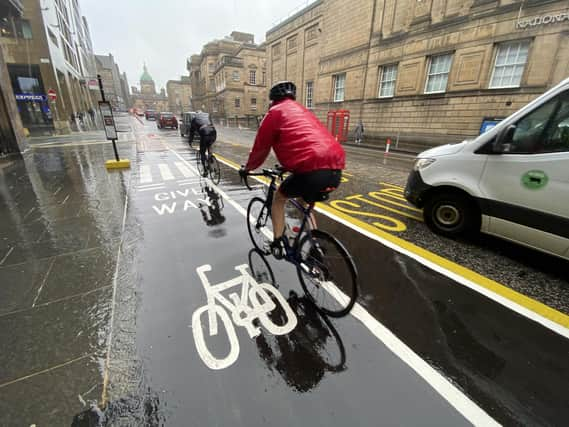Was Spaces for People furore a risk worth taking? Steve Cardownie


The report goes into some detail about the outcomes of recent consultation exercises, noting that in one “The market research was carried out by independent consultants, SMG and Jump Research” pointing out that this process attracted 583 responses. It goes on to say that “Surveys for residents and businesses were launched on the Council’s Consultation Hub. Around 17,600 people responded to the survey for residents and 179 businesses responded.”
As has already been reported in this paper the Council’s Consultation Hub survey was fairly critical of many of the measures while the market research survey was generally supportive leaving councillors to decide what weight should be attributed to both when reaching a decision.
Advertisement
Hide AdAdvertisement
Hide AdIt is common knowledge that the Council administration is preparing to ditch some of the more controversial aspects of the scheme but even those that they intend to retain will still have no shortage of critics, particularly in the Conservative Group which has firmly pinned its colours to the mast on this issue.
The Council’s intention to adopt the use of Experimental Traffic Regulation Orders will effectively allow many of the measures to be retained for a further 18 months which will ensure that this matter will be “live” come the council elections in May next year. The avoidance of having to go through a formal legislative process, including consultation, may appear to be an attractive proposition at the moment but the electorate may have other ideas, creating a political risk which, the Conservatives hope, could play into their hands.
Despite statements by the Convener of the Transport Committee, Councillor Lesley Macinnes, denying that the council is “anti-car” there is a strong perception amongst sections of the public that it is and some opposition groups will seek to capitalise on this by repeating this accusation at every opportunity.
Of course Edinburgh is not alone in this and similar policy issues have been to the forefront of council agendas throughout the UK as the drive to provide better conditions for public transport, cyclists and pedestrians gathers pace. As warnings about the possible catastrophic environmental consequences of complacency ring in politicians ears it is no surprise that councils will use this weapon in their armoury and introduce certain traffic initiatives in an effort to reduce emissions to help clean up the air.
Advertisement
Hide AdAdvertisement
Hide AdWhile Spaces for People traffic layouts were ostensibly brought in to help combat this pandemic the council has undoubtedly grasped this opportunity to further its own aims and demonstrate its “green credentials” by going for broke. New schemes have been introduced the length and breadth of the city, at a speed not normally associated with local government, to a mixed public reaction and which councillors will now appraise.
Big problems require big solutions but in its haste to bring in a plethora of new traffic measures the council administration may have mis-judged public reaction but, given the prize, perhaps it feels that it was a risk worth taking.
Comment Guidelines
National World encourages reader discussion on our stories. User feedback, insights and back-and-forth exchanges add a rich layer of context to reporting. Please review our Community Guidelines before commenting.